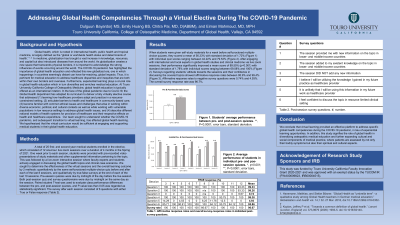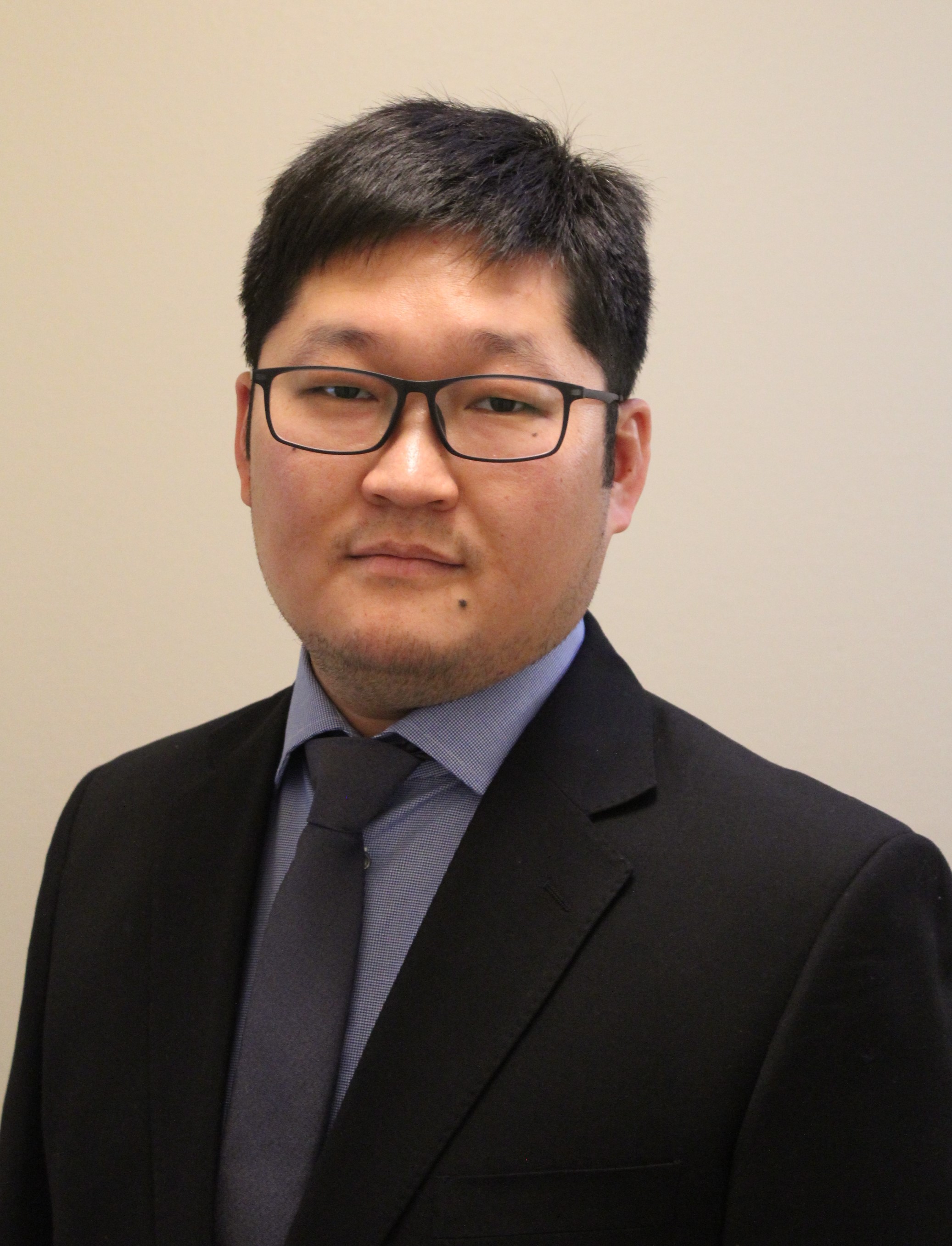Medical Education
Addressing Global Health Competencies Through A Virtual Elective During the COVID-19 Pandemic
Friday, March 31, 2023
12:00 PM East Coast USA Time


Dulguun Bayardorj, OMS (he/him/his)
Touro University California College of Osteopathic Medicine
San Francisco, California, United States
Presenting Author(s)
Background and Hypothesis: Experiential learning is a major component of global health education through which some of the global health competencies are addressed. The COVID-19 pandemic led to the unavailability of such avenues for delivery of global health curricular content at Touro University California College of Osteopathic Medicine. In Spring of 2021, the global health program offered a virtual elective for medical students to meet local and international experts who, via virtual platforms, addressed healthcare in resource-constrained settings, articulated barriers in community-based care, discussed common ethical issues and challenges in diverse work environment and dealing with vulnerable populations, and described different national model of health systems for provision of healthcare. Our study assesses the successes, challenges and opportunities of a virtual elective course.
Methods: A total of 25 first to third year medical students enrolled in the elective, which consisted of 12 one-hour live zoom sessions. We sought to determine the effectiveness of the virtual sessions and overall learning outcome by 2 methods: quantitatively by the same self-proctored multiple-choice quiz administered before and after each session for a total of 8 sessions, and qualitatively by true-false surveys at the end of each session for a total of 10 sessions. Quiz performance by only those students who submitted both quizzes for the session was included in data analysis. Each quiz consisted of questions specific to the session topics. Both post-session quiz and survey questionnaire were due by midnight on the same day as the session. Paired student T-test was used to evaluate class performance differences between the pre- and post-session quizzes, and P-value less than 0.05 was regarded as statistically significant. The survey after each session consisted of 6 questions with either True or False response.
Results: When students were given self-study materials and tested via self-proctored multiple-choice quizzes prior to live sessions, they scored between 42.22% and 79.53%, with mean score of 56.33% (standard deviation of 1.72%). However, after engaging in live interactions via zoom, the students performed significantly better with scores ranging between 69.08% and 100%, with mean score of 89.55% (standard deviation of 1.78%), which was statistically significant at p< 0.001. When surveyed about their attitude towards provided topics and study materials and confidence in discussing the covered topics and their future implication, students’ response was positive ranging between 95.8% and 99.3% rate, with an overall survey response rate of 96.7%.
Conclusion: We conclude that the virtual learning in lieu of experiential learning opportunities provided an effective platform to address specific global health competencies during the COVID-19 pandemic. In addition, this study signifies the role of global health in diversifying osteopathic medical education and further expanding cultural and social components of osteopathic approach, where patients are assessed by not only their bodily symptoms but also their spiritual and cultural aspects.
Acknowledgement of Research Study Sponsors and IRB: This study was funded by Touro University California Faculty Innovation Grant 2020-2021 and was determined exempt by Touro University California IRB.
Methods: A total of 25 first to third year medical students enrolled in the elective, which consisted of 12 one-hour live zoom sessions. We sought to determine the effectiveness of the virtual sessions and overall learning outcome by 2 methods: quantitatively by the same self-proctored multiple-choice quiz administered before and after each session for a total of 8 sessions, and qualitatively by true-false surveys at the end of each session for a total of 10 sessions. Quiz performance by only those students who submitted both quizzes for the session was included in data analysis. Each quiz consisted of questions specific to the session topics. Both post-session quiz and survey questionnaire were due by midnight on the same day as the session. Paired student T-test was used to evaluate class performance differences between the pre- and post-session quizzes, and P-value less than 0.05 was regarded as statistically significant. The survey after each session consisted of 6 questions with either True or False response.
Results: When students were given self-study materials and tested via self-proctored multiple-choice quizzes prior to live sessions, they scored between 42.22% and 79.53%, with mean score of 56.33% (standard deviation of 1.72%). However, after engaging in live interactions via zoom, the students performed significantly better with scores ranging between 69.08% and 100%, with mean score of 89.55% (standard deviation of 1.78%), which was statistically significant at p< 0.001. When surveyed about their attitude towards provided topics and study materials and confidence in discussing the covered topics and their future implication, students’ response was positive ranging between 95.8% and 99.3% rate, with an overall survey response rate of 96.7%.
Conclusion: We conclude that the virtual learning in lieu of experiential learning opportunities provided an effective platform to address specific global health competencies during the COVID-19 pandemic. In addition, this study signifies the role of global health in diversifying osteopathic medical education and further expanding cultural and social components of osteopathic approach, where patients are assessed by not only their bodily symptoms but also their spiritual and cultural aspects.
Acknowledgement of Research Study Sponsors and IRB: This study was funded by Touro University California Faculty Innovation Grant 2020-2021 and was determined exempt by Touro University California IRB.
